 On today's BradCast, while "all" is anything but "well", it may at least be a bit better than it was 24 hours ago at this time --- at least if the backing away from the likelihood of an apocalyptic military confrontation in the Middle East serves as any gauge. [Audio link to today's program is posted at end of summary.]
On today's BradCast, while "all" is anything but "well", it may at least be a bit better than it was 24 hours ago at this time --- at least if the backing away from the likelihood of an apocalyptic military confrontation in the Middle East serves as any gauge. [Audio link to today's program is posted at end of summary.]
Shortly after air time on Tuesday, Iran launched a 22 ballistic missile fusillade at two Iraqi military bases housing thousands of U.S. troops in response to Donald Trump's assassination late last week of revered Iranian General Qassem Soleimani. And shortly after that, a Ukrainian Airliner made by Boeing fell from the sky and crashed after take off from Tehran's airport, killing everyone on board. While it's still early and unclear what exactly caused the disaster, some experts believe the plane could have been attacked either accidentally or on purpose. We discuss.
As to the Iranian attack on U.S. troops, thankfully there were no casualties, either American or Iraqi, as Iran announced there would be no more military reappraisals for Soleimani's killing, so long as America does not attack the nation again. What turned out to be a largely symbolic revenge attack for domestic consumption by Iran appears to have been an act of mercy to help deescalate a military confrontation touched off late last week by Trump that many feared had been spiraling out of control since the targeted drone strike against Soleimani.
After declaring "All is well!" on Twitter Tuesday evening, amidst the missile assault and deadly airliner crash, Trump offered mercifully brief remarks at the White House on Wednesday morning, flanked by the Vice President and top cabinet members and military officials, to suggest he was taking the off-ramp offered him by the grown-ups in Iran. In between several blatant lies told about the anti-nuclear pact struck with Iran and other leading nations during the Obama Administration and on other related matters, Trump promised new economic sanctions against Iran, but said the nation "appears to be standing down", that Iran and the US should "work together" against their mutual enemy of ISIS, and that the United States is ready to embrace peace."
Whether any of that turns out to be true, given a President of the United States who lies as easily as he breathes, is anyone's guess. But it may allow many of us to breathe a bit easier for the moment, at least until Trump's next unnecessary self-inflicted crisis.
We're joined today by former Deputy Asst. Secretary of State MICHAEL FUCHS, to try and help clear up much of the confusion and anxiety of the last 12 hours since Iran's attack and the six days since Trump's assassination of Soleimani. Among the questions discussed with Fuchs...
- Was Iran's missile attack, in fact, an "act of mercy"?;
- Should we take any comfort from Trump's response today?;
- Will there be additional responses from Iran (including cyberattacks) against the U.S.?;
- Why were there no grown-ups in either the State or Defense Departments to warn Trump off of his wildly ill-considered murder of Iran's second most powerful official?;
- What can and should be done to keep a President from being able to do something as irresponsible and dangerous like this in the future?;
- Haven't both Republicans and Democrats in Congress ceded far too much of their Constitutional war-making authority to Presidents of both parties in recent years?;
- What can Congress do to prevent this President and future ones from acting so dangerously?;
- While the deal with Iran to block their path to a nuclear weapon had been a success (Trump's demonstrable lies about it not withstanding), until he unilaterally pulled the U.S. from the deal, wouldn't Iran be within their rights, and indeed wise, to now pursue a nuclear weapon, given the behavior of the U.S.?;
- With Iranian and Iraqi leaders both demanding that U.S. troops leave the region, and Trump pretending for years that he wants the same, wouldn't this be a great time to find common ground and finally pull out of our many decades-long disastrous adventures in the Middle East once and for all?;
- Can U.S. diplomacy actually rise in the Trump Administration with his widly hawkish Sec. of State Mike Pompeo?;
Fuchs, a former senior State Department official turned Senior Fellow at the Center for American Progress and Guardian columnist, gamely offers insightful answers to all of those questions and many others at the (hopeful) end of another series of exhausting, unnerving and confusing days during the horrific Trump Presidency.
"It is entirely possible that Iran might respond more to this most recent series of events. They might use cyberattacks, they might use their proxies throughout the region, which is a little bit hands-off, allows them a little bit of plausible deniability in their mind to attack US interests," Fuchs tells me. "But even if there is no immediate other response from Iran, we are still in this very dangerous and precarious moment where tensions between the two countries are incredibly high. And neither side seems, frankly, to have the ability nor the interest, at the moment at least, to finding a sustainable solution to these tensions. So for the moment, we want to hope for a very quick de-escalation, but the bigger problem is still very much there."
Finally, with the ability to breathe just a bit easier (at least for now) for the first time since the turn of the New Year, we turn to some quick coverage of some stories we've had to put off during Trump's latest world-threatening tantrum, beginning with the fact that two-thirds of Puerto Rico has been without power, and hundreds of thousands without clean water, since a major (and unusual) earthquake on Tuesday took out the U.S. island's largest power plant...
(Snail mail support to "Brad Friedman, 7095 Hollywood Blvd., #594 Los Angeles, CA 90028" always welcome too!)
|


 Sunday 'Close Enough' Toons
Sunday 'Close Enough' Toons A Pretty Weak 'Strongman': 'BradCast' 10/30/25
A Pretty Weak 'Strongman': 'BradCast' 10/30/25 'Green News Report' 10/30/25
'Green News Report' 10/30/25
 Proposal for 'First Politically Viable Wealth Tax' Takes Shape in CA: 'BradCast' 10/29/25
Proposal for 'First Politically Viable Wealth Tax' Takes Shape in CA: 'BradCast' 10/29/25 Monster Storm, Endless Wars, Gamed Elections:
Monster Storm, Endless Wars, Gamed Elections: 'Green News Report' 10/28/25
'Green News Report' 10/28/25 Let's Play 'Who Wants
Let's Play 'Who Wants Sunday 'Cartoonists Dilemma' Toons
Sunday 'Cartoonists Dilemma' Toons Exiled NOAA Scientists Resurrect Critical Disaster Database: 'BradCast' 10/23/25
Exiled NOAA Scientists Resurrect Critical Disaster Database: 'BradCast' 10/23/25  'Green News Report' 10/23/25
'Green News Report' 10/23/25 Trump-Allied GOP Partisan Buys Dominion Voting Systems: 'BradCast' 10/22/25
Trump-Allied GOP Partisan Buys Dominion Voting Systems: 'BradCast' 10/22/25 Trump, Republican Law(lessness) & (Dis)Order: 'BradCast' 10/21/25
Trump, Republican Law(lessness) & (Dis)Order: 'BradCast' 10/21/25 'Green News Report' 10/21/25
'Green News Report' 10/21/25 Celebrating 'No Kings': 'BradCast' 10/20/25
Celebrating 'No Kings': 'BradCast' 10/20/25 Sunday 'How It Started' Toons
Sunday 'How It Started' Toons SCOTUS Repubs Appear Ready to Gut Rest of Voting Rights Act: 'BradCast' 10/16/25
SCOTUS Repubs Appear Ready to Gut Rest of Voting Rights Act: 'BradCast' 10/16/25 'Green News Report' 10/16/25
'Green News Report' 10/16/25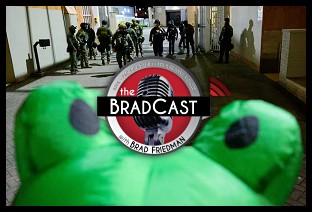 The 'Epstein Shutdown' and Other Autocratic Nightmares: 'BradCast' 10/15/25
The 'Epstein Shutdown' and Other Autocratic Nightmares: 'BradCast' 10/15/25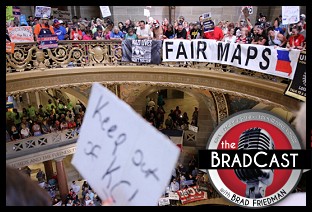 Group Vows to Block MO's GOP U.S. House Gerrymander: 'BradCast' 10/14/25
Group Vows to Block MO's GOP U.S. House Gerrymander: 'BradCast' 10/14/25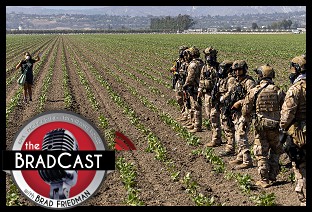 Trump Labor Dept. Warns Trump Policies Sparking Food Crisis: 'BradCast' 10/9/25
Trump Labor Dept. Warns Trump Policies Sparking Food Crisis: 'BradCast' 10/9/25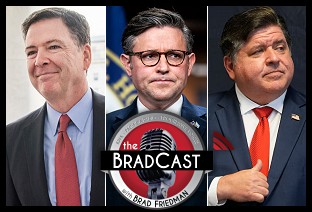 Trump's Losing Battles: 'BradCast' 10/8/25
Trump's Losing Battles: 'BradCast' 10/8/25 Trump, Roberts and His Stacked, Packed and Captured SCOTUS: 'BradCast' 10/7/25
Trump, Roberts and His Stacked, Packed and Captured SCOTUS: 'BradCast' 10/7/25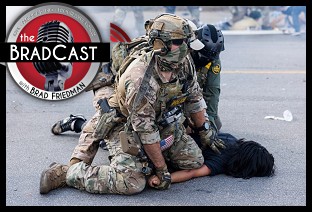 Trump Attempting His 'Invasion from Within': 'BradCast' 10/6/25
Trump Attempting His 'Invasion from Within': 'BradCast' 10/6/25 Biden Budget Expert: Mass Firings in Shutdown 'Illegal': 'BradCast' 10/2/25
Biden Budget Expert: Mass Firings in Shutdown 'Illegal': 'BradCast' 10/2/25 Why is DOJ Suing 'Blue' States for Their Voter Databases?: 'BradCast' 10/1/25
Why is DOJ Suing 'Blue' States for Their Voter Databases?: 'BradCast' 10/1/25
 VA GOP VOTER REG FRAUDSTER OFF HOOK
VA GOP VOTER REG FRAUDSTER OFF HOOK Criminal GOP Voter Registration Fraud Probe Expanding in VA
Criminal GOP Voter Registration Fraud Probe Expanding in VA DOJ PROBE SOUGHT AFTER VA ARREST
DOJ PROBE SOUGHT AFTER VA ARREST Arrest in VA: GOP Voter Reg Scandal Widens
Arrest in VA: GOP Voter Reg Scandal Widens ALL TOGETHER: ROVE, SPROUL, KOCHS, RNC
ALL TOGETHER: ROVE, SPROUL, KOCHS, RNC LATimes: RNC's 'Fired' Sproul Working for Repubs in 'as Many as 30 States'
LATimes: RNC's 'Fired' Sproul Working for Repubs in 'as Many as 30 States' 'Fired' Sproul Group 'Cloned', Still Working for Republicans in At Least 10 States
'Fired' Sproul Group 'Cloned', Still Working for Republicans in At Least 10 States FINALLY: FOX ON GOP REG FRAUD SCANDAL
FINALLY: FOX ON GOP REG FRAUD SCANDAL COLORADO FOLLOWS FLORIDA WITH GOP CRIMINAL INVESTIGATION
COLORADO FOLLOWS FLORIDA WITH GOP CRIMINAL INVESTIGATION CRIMINAL PROBE LAUNCHED INTO GOP VOTER REGISTRATION FRAUD SCANDAL IN FL
CRIMINAL PROBE LAUNCHED INTO GOP VOTER REGISTRATION FRAUD SCANDAL IN FL Brad Breaks PA Photo ID & GOP Registration Fraud Scandal News on Hartmann TV
Brad Breaks PA Photo ID & GOP Registration Fraud Scandal News on Hartmann TV  CAUGHT ON TAPE: COORDINATED NATIONWIDE GOP VOTER REG SCAM
CAUGHT ON TAPE: COORDINATED NATIONWIDE GOP VOTER REG SCAM CRIMINAL ELECTION FRAUD COMPLAINT FILED AGAINST GOP 'FRAUD' FIRM
CRIMINAL ELECTION FRAUD COMPLAINT FILED AGAINST GOP 'FRAUD' FIRM RICK SCOTT GETS ROLLED IN GOP REGISTRATION FRAUD SCANDAL
RICK SCOTT GETS ROLLED IN GOP REGISTRATION FRAUD SCANDAL VIDEO: Brad Breaks GOP Reg Fraud Scandal on Hartmann TV
VIDEO: Brad Breaks GOP Reg Fraud Scandal on Hartmann TV RNC FIRES NATIONAL VOTER REGISTRATION FIRM FOR FRAUD
RNC FIRES NATIONAL VOTER REGISTRATION FIRM FOR FRAUD EXCLUSIVE: Intvw w/ FL Official Who First Discovered GOP Reg Fraud
EXCLUSIVE: Intvw w/ FL Official Who First Discovered GOP Reg Fraud GOP REGISTRATION FRAUD FOUND IN FL
GOP REGISTRATION FRAUD FOUND IN FL

































